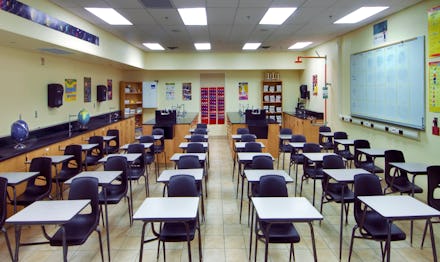This Georgia coronavirus disaster is why we can't send kids back to school yet

As the pandemic rages on, so does the debate about whether schools should reopen in fall. The current administration has said that it’s time for kids to get back to class, but is it safe? Last night, officials announced that 260 employees in Georgia’s largest school district — Gwinnet County Public Schools — have tested positive or been exposed to COVID-19, and that they will need to adjust their back-to-school plans accordingly, CNN reported.
Gwinnet County officials said they need to be flexible about how and when schools in the district reopen. "As of last Thursday, we had approximately 260 employees who had been excluded from work due to a positive case or contact with a case," GCPS spokeswoman Sloan Roach told CNN. “This number is fluid as we continue to have new reports and others who are returning to work.” Schools in Gwinnet County were set to open August 12th with an option for digital learning, and how those plans will change hasn’t been announced.
Gwinnet County’s school system is just outside of Atlanta and serves around 180,000 students. Trump has said publicly that keeping schools closed is causing, “more death,” and, “economic harm,” but what might happen if all those children and their families had been exposed to the virus? We can’t say for sure, but if Georgia’s recent sleepaway camp debacle is any indication, the results could be horrifying.
Last Friday, the Centers for Disease Control and Prevention (CDC) released a study about a novel coronavirus outbreak in June at a summer camp in Georgia. According to data released by Georgia’s Department of Health, it only took four days for 44% of the population of the camp — 260 of 597 campers and employees — to become infected. For clarity, that percentage only includes individuals who received a positive test result in the state of Georgia, but not everyone who went to the camp was tested. The camp situation is only one example, but Georgia’s response to the pandemic has been generally fraught with criticism. Trump himself publicly called out Georgia governor Brian Kemp for “reopening too soon.”
Proponents of school reopening often claim that children aren’t being affected by COVID-19 and that getting kids back in school will be an economic boon. “The lower they are in age, the lower the risk,” Trump said in a White House briefing on Thursday as part of his argument for school reopening. But that’s not what happened at summer camp. In that instance, the youngest children tested positive more often than older children and young adults. Just over 50% of 6-10 year-olds at the camp tested positive compared with 44% of 11-17 year-olds, and 33% of people aged 18-21, CNN reported.
Presumably, most six-year-olds are unable to self-quarantine, so even if the myth that children don’t get sick from COVID-19 was true, if schools reopen fully, infected school aged children will inevitably pass the virus on to their caregivers. Current research suggests that while children do not often have severe cases of COVID-19, they can develop life threatening complications like pediatric multi-system inflammatory syndrome, and some scientists think that children may spread the virus more efficiently than adults.
So, even if you don’t care about the lives of American children, taking hundreds of thousands of sick adults out of work and adding them to our already overtaxed healthcare system doesn’t really seem like a great way to kickstart the economy.